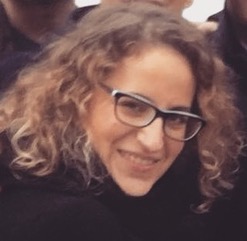Internship in Independent Living Center in Stockholm, 2021, Mabel Giraldo
Mabel Giraldo
University of Bergamo, Italy
October-November 2021
 My name is Mabel Giraldo. I'm a PhD and research fellow at University of Bergamo in Italy, Department of Human and Social Sciences.
My name is Mabel Giraldo. I'm a PhD and research fellow at University of Bergamo in Italy, Department of Human and Social Sciences.
From October 11th to November 14th 2021, I was hosted by the Stockholm University at the Department of Special Education as visiting researcher, related to “Outgoing Visiting Fellowship” (grant) under the “STaRs Program (Supporting Talented Researchers) - action 2, 2020” of University of Bergamo.
My research interests focus on the construct of self-determination and related co-design and evaluation models to promote and support it for adults (and elderly) with intellectual disabilities, especially within the living settings. My current research-intervention project, entitled Self-determination and disability in adulthood. From participatory research to an intervention design model, aims at developing an individualized and integrated evaluation and co-planning model to guide living service in the promotion of self-determination in adults and elderly people with intellectual disabilities in Bergamo area. In particular, in order to carry out individualized living co-project based on the real needs, desires and aspirations of the person and to make effective the values inherent in the construct of self-determination, the project intends to propose a research that gives voice to people with intellectual disabilities and their right to be involved in decisions relating to support and assistance services, as well as to all the essential aspects of their existence, thus favoring and supporting their active participation in the construction of their own life project.
For this reason, to enhance my studies, during my stay in Sweden, I visited the Swedish Independent Living Institute; this was in fact a perfect occasion to get in touch with one of the leading policy development institutes specializing in consumer-driven policies for disabled peoples' self-determination, self-respect and dignity. Also, as a scholar, I was honored to meet in person Adolf Ratzka, one of the most leading figures in the international movement for the rights, the autonomy and the self-determination of persons with disabilities, where the contribution of the Swedish institute has been irreplaceable.
During my internship, ILI gave me the opportunity not only to visit the institute and know existing projects, but also to directly contact some experts from the main Swedish organizations (such as ILI, STILL, Jag, DHR, FUB, etc.) to critically reflect on the concept of de-institutionalization. This latter point, strictly related to my current research project, was deeper explored through a discursive interview aimed at highlighting a double aspect: on the one hand, lights and shadows that the right of the person with disabilities to choose their living setting has taken on in recent decades; on the other hand, the further changes necessary to make this right even more real according to art. 19 of UNCRPD (2006).
As a result, thanks to the internship, I got information about the living situation of adult with disabilities (especially intellectual disability) and pointed out an Italy-Sweden comparative analysis on the services and organizations for adults with intellectual disabilities. This involved getting deeply into the understanding of the Swedish personal assistance system (still almost unknown in the Italian debate) and being able to highlight positives but also shortcomings.
Therefore, this internship gave me the opportunity not only to know ILI activism, but also to better understand the European scientific, social, and political debate around the issues of self-determination and empowerment for the person with intellectual disabilities (in adulthood and the elderly) and the related living settings and to know more closely a leading country like Sweden.
Today, I come back home with (some) answers, but above all with many questions. I’m aware that the Italian path towards a real de-institutionalization process is still very long but with the intention to contribute to any possible improvements.
I am sincerely grateful to this organization (especially to its Director, Jamie Bolling) for warm welcoming me. I will treasure this intense period of research and always keep it alive by working hard to generate new and innovative research and community trajectories.

